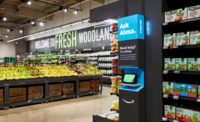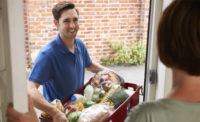Takeoff’s on-site micro-fulfillment centers automate online grocery shopping
Company’s CEO Max Pedro shares how Takeoff’s system can help retailers turn part of their store into a distribution center.

Takeoff installs micro fulfillment centers in the back of grocery stores, creating mini distribution centers that can process online grocery orders. Rendering provided by Takeoff.
In the world of online shopping, one sector in particular has historically lagged behind the others — groceries.
Grocery shopping is as much ritual as it is chore, making it hard to shift consumer behavior. Meanwhile, the required cold chain logistics make it difficult for grocers to shift entirely away from local stores in every community.
Now, though, COVID has changed the equation. During the pandemic, shoppers became more willing to alter their rituals in favor of safety, prompting many to finally try ordering groceries online. The sudden surge of demand — most of which is expected to continue even if COVID safety concerns fade — created new problems for retailers.
Thus far, the most popular solution seems to be jamming online orders into the existing framework.
Whether consumers are ordering directly from a retailer like Walmart, or going through a third-party like Instacart, in most cases the effect is the same: Private shoppers walk the aisles of the local store, weaving between customers, scanning the shelves, and collecting the items.
But one company has a better idea.
Takeoff install mini fullfilment centers
Takeoff is a company that sets up micro fulfillment centers inside local grocery stores, essentially creating mini distribution centers.
This pulls the online order collection process out of the consumer-facing aisles, while allowing for significantly more automation. In short, when it comes to consumer stores and corporate distribution centers, Takeoff is the best of both worlds.
And the company’s automated fulfillment process is 20 times faster than manual picking on the store floor.
Founded by Max Pedro and José Vicente Aguerrevere in 2016 — both of whom had been executives at different grocery chains — the pair created it expecting online grocery shopping to eventually become more mainstream. Then the pandemic happened.
“Since the start of the pandemic, online grocery penetration has accelerated by five years. We expect this shift to demand to continue in the long term,” explains Pedro, CEO of Takeoff. “Grocers have absolutely recognized this shift and they see the opportunity in the market.”
Currently, Takeoff has 22 sites in operation and more in the pipeline, while the company’s website boasts partnerships with Albertson's, Carrefour, Jewel Osco, Safeway, Woolworth's, and more.
Although Takeoff’s micro fulfillment centers can be placed within multiple types of stores — such as in dedicated warehouses or dark stores — it’s grocery stores that create the ideal setup, Pedro said.
Aside from already having prime locations within communities, they also already have processes in place to manage items that aren’t easily automated, such as on-site delis and bakeries. So those items can be picked manually and then added to order where the rest of the items were packaged via automation
Even automating just 70 percent of online orders can create a lot of benefits for grocers, Pedro said. He also doesn’t expect in-person shopping options to ever go away completely.
“There will always be shoppers who prefer the shopping experience of a grocery store. What will change, perhaps, is the format of a store,” he explained. “People get excited to go to the store to feel fresh produce in their own hands, to explore the bakery or the deli, to smell the flowers. What they don’t get excited about is feeling a can of soup, or gathering a box of cereal. At Takeoff, we want to optimize and automate the parts of grocery shopping that feel like a ‘chore.’”
Installing the micro fulfillment center does require some upfront costs for grocers. The company’s setup includes hardware, cloud orchestration, industrial AI, data-driven analytics, partnership and support, and more.
However, Pedro said retailers shouldn’t be deterred by the initial investment.
“It is important to recognize that there is also an inherent cost in not investing in a long term and sustainable ecommerce strategy — one that will become more apparent as online penetration increases,” he explained. “There’s no doubt that online grocery shopping will continue to increase in demand within the next few years.”
Offering more than fulfillment automation
Beyond automating the online orders, there are other advantages to Takeoff.
The company’s system provides real-time inventory information, eliminating substitutions and out-of-stocks for end consumers. It also tracks expiration dates and categorizes items based on their food safety guidelines like ideal storage temperatures, chemical storage regulations, etc.
Takeoff’s system also keeps track of items that are in high demand, and uses machine learning to automatically store items based on their popularity. Low demand items will be placed towards the back, with higher demand items placed toward the front to ensure even faster automated fulfillment.
“Our systems are constantly evolving and highlighting new ways to help our retailers keep up with the latest trends,” Pedro said.
Looking for a reprint of this article?
From high-res PDFs to custom plaques, order your copy today!






